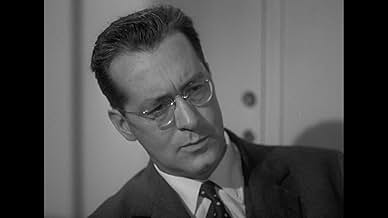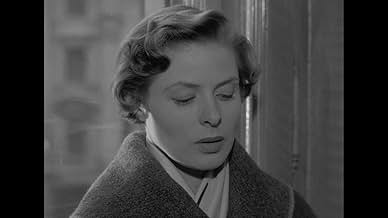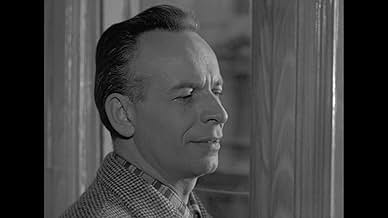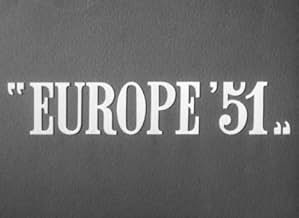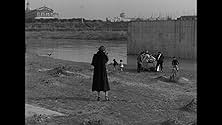VALUTAZIONE IMDb
7,4/10
5151
LA TUA VALUTAZIONE
Una donna benestante diventa ossessionata dall'umanitarismo quando il suo giovane figlio si suicida.Una donna benestante diventa ossessionata dall'umanitarismo quando il suo giovane figlio si suicida.Una donna benestante diventa ossessionata dall'umanitarismo quando il suo giovane figlio si suicida.
- Regia
- Sceneggiatura
- Star
- Premi
- 4 vittorie e 1 candidatura in totale
Carlo Hintermann
- Extra
- (non citato nei titoli originali)
Antonio Pietrangeli
- Psichiatra
- (non citato nei titoli originali)
Rossana Rory
- Infermiera della casa di cura
- (non citato nei titoli originali)
Recensioni in evidenza
Do you remember when film featured up close photography, colorless images allowing character interaction to be the foreground, and spoken dialogs with noticeable pauses? Do you remember the last time a film haunted you? Correct
it simply flashed to mind without your invitation! If you can touch any of these viewing memories, this film may be worthy of 108 minutes.
Europe '51 is directed by Roberto Rossellini, and stars the stunning master of nuanced emotion, Ingrid Bergman. The 1952 film is set in Rome, post WWII, and features wonderful set designs to distinguish the comfortable life and the dire struggles known to the rest of us.
As Irene, Bergman undergoes a metamorphosis that will beckon the dark experience of an unexpected loss of a beloved, and the consequential deep fall into emptiness. Irene is first introduced to us as the consummate hostess with a natural grace and instinctive flair for entertaining. She ignores the voice of her only son repeatedly to fulfill her social obligations. Bonded by their time of closeness under the threat of air raids, Irene is no longer burdened to protect and comfort her son in the present post-war calm.
Her 10 year old son, Michele, takes his life after repeated, failed attempts to gain his mother's affection and attention. Irene is paralyzed by the loss, and her husband, George, accommodates her every wish until he comes to think she is having a love affair. The grieving mother finds solace in service to those in need, and her family is bewildered. Her long absences from home, loss of interest in social engagements, and avoidance of her husband leave her family troubled.
Irene is transitioning spiritually as a means to heal her loss. She is introduced to a family in need of assistance, and she finds great joy in acts of compassion. Irene assists this family to secure treatment for their sickly son, she then befriends a single mother of six dependents, and tirelessly administers care to a young, isolated prostitute whose life is yielding quickly to tuberculosis. Irene's deeds are in conflict with her social position, and neither her husband nor her mother can compel her return to them. Irene has become a passionate, driven arm of charity in service to her community. She can not return to the life she knew prior to the loss of her young, beloved son. Her family can not understand the sweeping changes Irene has internalized. They confine her to a mental institution. She accepts this placement, and silently radiates a saintly mercy as she encounters the helplessness of the other patients.
Fortunately, Rossellini allows you to script your own ending as you look upon Irene from behind the confinement of cell bars at the mental institution. She has been visited by her family, and the family of the sickly boy she assisted. After your viewing, it would be good to hear from you.
Europe '51 is directed by Roberto Rossellini, and stars the stunning master of nuanced emotion, Ingrid Bergman. The 1952 film is set in Rome, post WWII, and features wonderful set designs to distinguish the comfortable life and the dire struggles known to the rest of us.
As Irene, Bergman undergoes a metamorphosis that will beckon the dark experience of an unexpected loss of a beloved, and the consequential deep fall into emptiness. Irene is first introduced to us as the consummate hostess with a natural grace and instinctive flair for entertaining. She ignores the voice of her only son repeatedly to fulfill her social obligations. Bonded by their time of closeness under the threat of air raids, Irene is no longer burdened to protect and comfort her son in the present post-war calm.
Her 10 year old son, Michele, takes his life after repeated, failed attempts to gain his mother's affection and attention. Irene is paralyzed by the loss, and her husband, George, accommodates her every wish until he comes to think she is having a love affair. The grieving mother finds solace in service to those in need, and her family is bewildered. Her long absences from home, loss of interest in social engagements, and avoidance of her husband leave her family troubled.
Irene is transitioning spiritually as a means to heal her loss. She is introduced to a family in need of assistance, and she finds great joy in acts of compassion. Irene assists this family to secure treatment for their sickly son, she then befriends a single mother of six dependents, and tirelessly administers care to a young, isolated prostitute whose life is yielding quickly to tuberculosis. Irene's deeds are in conflict with her social position, and neither her husband nor her mother can compel her return to them. Irene has become a passionate, driven arm of charity in service to her community. She can not return to the life she knew prior to the loss of her young, beloved son. Her family can not understand the sweeping changes Irene has internalized. They confine her to a mental institution. She accepts this placement, and silently radiates a saintly mercy as she encounters the helplessness of the other patients.
Fortunately, Rossellini allows you to script your own ending as you look upon Irene from behind the confinement of cell bars at the mental institution. She has been visited by her family, and the family of the sickly boy she assisted. After your viewing, it would be good to hear from you.
At first I wasn't sure what the point was of Europa '51. It's a movie that sneaks up on you because the early scenes are not at all about the same thing as everything that comes after. I kept thinking this was going to be a family drama, or some kind of political drama, but I was wrong. I quite like the development of this plot, because it shows how traumatic events can help shape our lives, and change who we are. At the start of this film I didn't care all that much for Ingrid Bergman's character, and I was a bit frustrated at the prospect of following her for the full runtime of this movie. Little did I realize, there were big changes on the way, and that transition impacted me even more because I saw the emotional journey of this character from where she began to where it all ended. I loved the arc of her story, and I was surprised how relevant it seems to the life we all lead every single day.
I think the most impactful thing to me in Europa '51 is that the story made me introspective. I always applaud any film that can get me to the point where I'm contemplating the way I live my own life. The movie shows how our world can be a dark and cynical place, but it also shows the power of love within all that darkness. I was emotional in the climax, not only because I was touched by the way the protagonist had come to view her place in the world, but also because of the way others reacted to her views. It's interesting to see a film tackle this major question of morality without taking it down a religious path. Instead it shows how even those in organized religion can be resistant to the very love and kindness that they preach. Needless to say, I was energized by Europa '51, and found it to be a powerful film that I'd love to explore more and will probably quote to others in the future.
I think the most impactful thing to me in Europa '51 is that the story made me introspective. I always applaud any film that can get me to the point where I'm contemplating the way I live my own life. The movie shows how our world can be a dark and cynical place, but it also shows the power of love within all that darkness. I was emotional in the climax, not only because I was touched by the way the protagonist had come to view her place in the world, but also because of the way others reacted to her views. It's interesting to see a film tackle this major question of morality without taking it down a religious path. Instead it shows how even those in organized religion can be resistant to the very love and kindness that they preach. Needless to say, I was energized by Europa '51, and found it to be a powerful film that I'd love to explore more and will probably quote to others in the future.
EUROPA 51 is an odd film. Irene (Bergman) is the wife and mother in a rich family, in affluent surroundings. Hers seems a perfect world, but she is too self-centered to realize that her son needs attention and love.
EUROPA 51 reflects the situation in Europe in 1951, six years after the end of WW II. Work is scarce. poverty is rife, the impersonality of industry is overwhelming society, but against this general background some personal problems stick out: Irene focuses on being an adroit host and having her house spotlessly clean; her husband wrongly fears that she is cheating on him with a journalist; and their son feels ignored and throws himself down a staircase, with fatal consequences.
Irene feels very guilty about losing her son, moves away from home, and descends into the underworld of poverty, helping people in the process. This is where a memorable performance surfaces, by Giuletta Masina, the wife of famous Italian director Federico Fellini, who injects life into the whole movie, in contrast with Irene's increasingly quiet soul.
The fact that her own husband and circle of friends see her as approaching madness reflects the tragedy that tends to pursue the individual who dares to show feelings and concerns in relation to his/her fellow neighbor. In this case, Irene helps a number of people, takes genuine interest in their predicaments, but her reward is questionable: she sees her husband leave her behind the bars of a psychiatric ward, feeling intolerably lonely, but common people see her as a saint.
Ultimately, it is a film in equal measure wise and wayward. Perhaps I cannot avoid looking at it with 21st Century eyes, and I lack knowledge about the mindset of Italian society in the early 1950s. Still, I had a problem attaching credibility to this film.
That said, Bergman was never more physically stunning than in this film, and her acting is first class.
Director Rossellini shows steely determination driving forward this unusual film. Photography is quite good. Script is generally competent. Acting by Bergman and Masina is excellent, the rest of the cast, Knox included, does not shine so much.
The film's main flaw is that it is overlong by some 20 minutes, but any Rossellini-Bergman collaboration deserves attentive watching.
EUROPA 51 reflects the situation in Europe in 1951, six years after the end of WW II. Work is scarce. poverty is rife, the impersonality of industry is overwhelming society, but against this general background some personal problems stick out: Irene focuses on being an adroit host and having her house spotlessly clean; her husband wrongly fears that she is cheating on him with a journalist; and their son feels ignored and throws himself down a staircase, with fatal consequences.
Irene feels very guilty about losing her son, moves away from home, and descends into the underworld of poverty, helping people in the process. This is where a memorable performance surfaces, by Giuletta Masina, the wife of famous Italian director Federico Fellini, who injects life into the whole movie, in contrast with Irene's increasingly quiet soul.
The fact that her own husband and circle of friends see her as approaching madness reflects the tragedy that tends to pursue the individual who dares to show feelings and concerns in relation to his/her fellow neighbor. In this case, Irene helps a number of people, takes genuine interest in their predicaments, but her reward is questionable: she sees her husband leave her behind the bars of a psychiatric ward, feeling intolerably lonely, but common people see her as a saint.
Ultimately, it is a film in equal measure wise and wayward. Perhaps I cannot avoid looking at it with 21st Century eyes, and I lack knowledge about the mindset of Italian society in the early 1950s. Still, I had a problem attaching credibility to this film.
That said, Bergman was never more physically stunning than in this film, and her acting is first class.
Director Rossellini shows steely determination driving forward this unusual film. Photography is quite good. Script is generally competent. Acting by Bergman and Masina is excellent, the rest of the cast, Knox included, does not shine so much.
The film's main flaw is that it is overlong by some 20 minutes, but any Rossellini-Bergman collaboration deserves attentive watching.
It's a bit melodramatic, but up until Irene's final conversation with Cassatti the Commie, *Europa '51* is a very interesting film, first about a pampered rich woman's reaction to her son's death, then about the difference between windy Marxist propaganda and real compassion.
However, at that point, Rossellini's original idea takes over: He wanted to make a film about what would happen if a truly saintly person ever showed up in the modern world. And he had a very good idea of what would happen--or at least a very insistent one. The people here obviously behave the way they do solely to make the point Rossellini wants to make, even when their behavior doesn't seem very plausible. In defter hands, such manipulation can work. Here, though, you can see the tracks Rossellini has rather clumsily laid down to move the story where he wants it to go.
However, at that point, Rossellini's original idea takes over: He wanted to make a film about what would happen if a truly saintly person ever showed up in the modern world. And he had a very good idea of what would happen--or at least a very insistent one. The people here obviously behave the way they do solely to make the point Rossellini wants to make, even when their behavior doesn't seem very plausible. In defter hands, such manipulation can work. Here, though, you can see the tracks Rossellini has rather clumsily laid down to move the story where he wants it to go.
Europa 51 has a big heart, this much is clear. It's a story where Rossellini and his collaborators want to pose a basic question: what does someone have to do, like literally do with their own hands and wills and TIME, actually taking time and energy out of their days, to make a difference for people? The question may be surrounded by an, arguably, heavy-handed set-up, where Ingrid Bergman plays an ambassador's wife in Italy, and their son, a bit of a spoiled mama's boy (or, no, maybe he's just the sensitive sort, you pick, but either way not dubbed particularly well), dies accidentally. Bergman's Irene can't stand herself for what has happened - all her time being a dilettante and not spending enough time with her son made this happen - and she can barely go on.
Someone, a friend who has Communist ties, tries to convince her that perhaps it's time to make a change amid this time of Societal Upheaval (in caps) as political sides are being more sharply drawn. She sees how people suffer, and a day at a factory basically makes her completely light-headed (a montage of images, if memory serves, makes this clear). She wants to help. Maybe if she puts her energies to positive use, to help others, she can... what, find some solace? Alleviate her guilt? Or that now she can't be a mother to her son - and there's not much effort between her and her husband to find love again - so why not be a Mother to others? It's a little more difficult than that, of course, which is the riding factor of conflict in the narrative.
Bergman plays this character with all of the beats just right. Early on in those first scenes with her and her son you might wonder whether the writing isn't totally clear - IS she being a bad mother, or is he just whining, or is it a little 'much' determining either, who knows - but she plays it just right, this woman in her life who has it all and doesn't have to worry about much. This includes hearing conversations about class struggles (this before she sees them first hand) and can barely comprehend it. How Bergman channels grief is even better, showing us a face that has the life totally drained out, and she is always *listening* as an actress too to what's around her, and is a strong listener which is key. Ironic then that many of these, almost all of them, are speaking Italian and are dubbed over - this includes Giuletta Masina, who plays a local housewife.
Not all of the writing is superb here, at least for me. It's surprisingly melodramatic in its last quarter as Irene is looked at as being completely crazy (possibly, borderline, criminal) in how she's helping these people, which includes keeping one man evading prosecution in her home. I have to wonder if this story could work today, though a filmmaker like Scorsese, one of Rossellini's disciples, sort of made his version with Bringing Out the Dead - a protagonist who is haunted by death and wants to make a difference. It is a very hard thing to be saintly, or just be a decent person when there are many, many indecent things and people that go about in this world, certainly in this context post-war, post-fascist-cum-Communist Italy.
There's a lot to digest here, even if some of it may come off as dated or simplistic. But, once again as with Stromboli, the combination of a director with a clear, very moral message, and an actress giving it her ALL (and it's a case where Bergman does give one of her best performances from this period, even if the film isn't), that you can watch it and be wrapped up in this woman's drama.
Someone, a friend who has Communist ties, tries to convince her that perhaps it's time to make a change amid this time of Societal Upheaval (in caps) as political sides are being more sharply drawn. She sees how people suffer, and a day at a factory basically makes her completely light-headed (a montage of images, if memory serves, makes this clear). She wants to help. Maybe if she puts her energies to positive use, to help others, she can... what, find some solace? Alleviate her guilt? Or that now she can't be a mother to her son - and there's not much effort between her and her husband to find love again - so why not be a Mother to others? It's a little more difficult than that, of course, which is the riding factor of conflict in the narrative.
Bergman plays this character with all of the beats just right. Early on in those first scenes with her and her son you might wonder whether the writing isn't totally clear - IS she being a bad mother, or is he just whining, or is it a little 'much' determining either, who knows - but she plays it just right, this woman in her life who has it all and doesn't have to worry about much. This includes hearing conversations about class struggles (this before she sees them first hand) and can barely comprehend it. How Bergman channels grief is even better, showing us a face that has the life totally drained out, and she is always *listening* as an actress too to what's around her, and is a strong listener which is key. Ironic then that many of these, almost all of them, are speaking Italian and are dubbed over - this includes Giuletta Masina, who plays a local housewife.
Not all of the writing is superb here, at least for me. It's surprisingly melodramatic in its last quarter as Irene is looked at as being completely crazy (possibly, borderline, criminal) in how she's helping these people, which includes keeping one man evading prosecution in her home. I have to wonder if this story could work today, though a filmmaker like Scorsese, one of Rossellini's disciples, sort of made his version with Bringing Out the Dead - a protagonist who is haunted by death and wants to make a difference. It is a very hard thing to be saintly, or just be a decent person when there are many, many indecent things and people that go about in this world, certainly in this context post-war, post-fascist-cum-Communist Italy.
There's a lot to digest here, even if some of it may come off as dated or simplistic. But, once again as with Stromboli, the combination of a director with a clear, very moral message, and an actress giving it her ALL (and it's a case where Bergman does give one of her best performances from this period, even if the film isn't), that you can watch it and be wrapped up in this woman's drama.
Lo sapevi?
- QuizThe square Irene and Andrea drive to is the Campidoglio in Rome. The equestrian statue is of Marcus Aurelius, emperor and stoic philosopher.
- BlooperWhen Michele falls down the stairs, his parents rush to the car to get him to the hospital. When his mother finds him, she is wearing the white gown she wore at the dinner. When they first arrive at the hospital, she has a fur coat on. A few hours later, suddenly she has changed into a grey suit.
- Citazioni
Irene Girard: It is just that the love we feel for those closest to us, for those who should be and maybe really are dearest to us, suddenly isn't enough. It seems too selfish, too narrow. So, that we feel the need to share it, to make our love bigger until it embraces everyone.
- Versioni alternativeIngrid Bergman, Alexander Knox and the other English-speaking actors dub their own voices into English for the English version.
- ConnessioniEdited into Damned! Daney (1991)
- Colonne sonoreBésame Mucho
Written by Consuelo Velázquez
I più visti
Accedi per valutare e creare un elenco di titoli salvati per ottenere consigli personalizzati
- How long is Europe '51?Powered by Alexa
Dettagli
Botteghino
- Lordo in tutto il mondo
- 9381 USD
- Tempo di esecuzione1 ora 58 minuti
- Colore
- Proporzioni
- 1.37 : 1
Contribuisci a questa pagina
Suggerisci una modifica o aggiungi i contenuti mancanti

Divario superiore
By what name was Europa '51 (1952) officially released in Canada in English?
Rispondi
